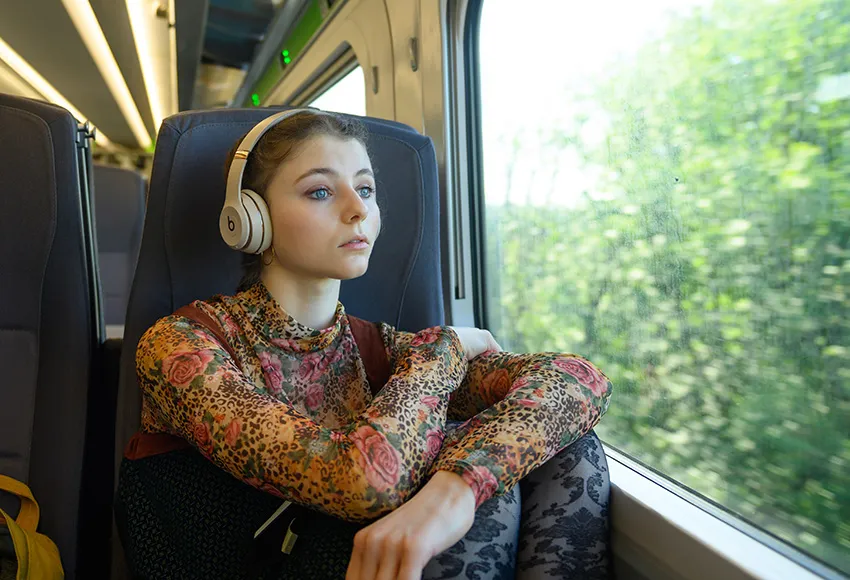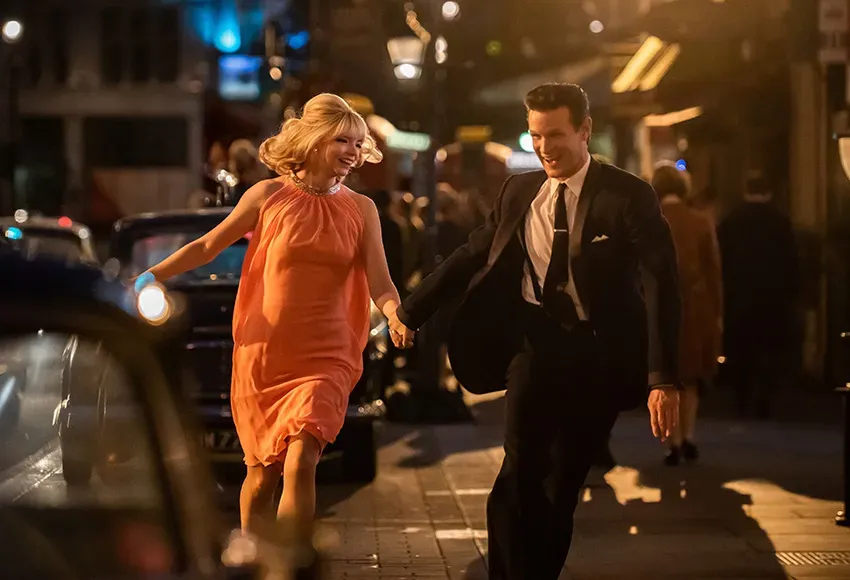LAST NIGHT IN SOHO
Theaters
The trippy Last Night in Soho from Edgar Wright (Shaun of the Dead) is a pastiche of classic psychedelic terror and grimy, sexually charged thriller ideas gleefully culled from Hammer horror films, Hitchcock staples, Mario Bava and Dario Argento favorites, 1960s pop music and fashions, and so many additional influences that it's impossible to list them all. His latest is a candy-colored whodunit of perception and identity, one that cleverly slips through the looking glass and back again with energetic ease.
Unfortunately, it's also more of a technical marvel than an emotionally involving one. Characters are rarely allowed the freedom to breathe, most coming across more as plastic figurines to be swiftly moved across a phantasmagoric chessboard than live as human beings worth caring about. It is only by the sheer charismatic strength of Thomasin McKenzie, Anya Taylor-Joy, and the late, great Dianna Rigg that this film registered with me at all, and without the presence of these three talented ladies, I'm not sure there'd be much worth talking about.

Eloise (McKenzie) is a fashion student from Cornwall who has come to London ready to see her dreams become a reality. Obsessed with the 1960s and overflowing with talent, her designs have an inspired retro flair that makes her immediately popular with her instructors, while also drawing the ire of some of her fellow students.
Unhappy in the dorms, Eloise takes an upstairs room in Soho, rented to her by the stern Ms. Collins (Rigg), and quickly makes the place her own. She is also a bit of an amateur psychic, possessed of an ability to see images of the past staring back at her from almost any reflective surface.
It's at this point where the intricately convoluted screenplay by Wright and co-writer Krysty Wilson-Cairns (1917) kicks into high gear. When things are going well, Eloise typically sees images of her deceased mother smiling back at her. Today, Eloise is having visions of Sandie (Taylor-Joy), a gorgeous young woman about her age who came to London in the 1960s with aspirations to become a star.
Did she, though? Was her apparent romance with promoter and manager Jack (Matt Smith) the idyllic first step to achieving her dreams? Or did something more ominous take place, like a descent into madness, abuse, and despair, all of which concluded in a bloody scene of torture and murder right in the very apartment Eloise calls home?
Past and present zip back and forth, as Wright juxtaposes current events with past terrors to tell a tale of self-determination overcoming patriarchal oppressions and inherently sexist hierarchies that were left to fester and grow in the foundation underneath Soho for over half a century. Eloise must solve the mystery of Sandie and Jack's violently cantankerous relationship without going insane herself, and she goes about it with a plucky determination that would make Nancy Drew, Jessica Fletcher, and even Miss Marple proud.
As a visual exercise, Last Night in Soho is marvelous. The neon-lit cinematography by Chung-hoon Chung (Oldboy) is reminiscent of Ridley Scott's neo-noir output of the 1980s, most notably Someone to Watch Over Me and Black Rain, while production designer Marcus Rowland (Rocketman) melds past a present with mesmeric precision. The excellent score by Steven Price (Gravity) beautifully intermingles with a strong soundtrack made up primarily of '60s pop sensations. Best of all are the incredible costumes by Odile Dicks-Mireaux (Brooklyn); her designs mesh time periods together into a glorious mélange of color and movement that's sublime.
It's the storytelling that I have a problem with. Everything feels too mechanical, too orchestrated. Wright seems so excited to be pulling from – and paying homage to – so many varied influences that precious little actually feels real. It's like watching immaculately coifed mannequins sprint to and fro, and while they look magnificent, that does not mean I cared about much that was happening or the solutions hiding within this time-traveling puzzle box.
What Wright does have working for him are the performances of his three primary stars, McKenzie, Taylor-Joy, and Rigg. They all give themselves over to the material, and watching how they manage to work in such hypnotic tandem – even though one of the trio's characters is distanced from the other two by almost six decades – is glorious. Rigg is particularly spellbinding, and even though her appearances are brief, the way her Ms. Collins transforms into a potently fascinating focal point is wondrous to behold.
Last Night in Soho is too well acted and far too technically imaginative to dismiss what Wright has done here. But for right now, this murderous time machine connecting the swinging sixties with the world of today is too emotionally aloof for me to be able to happily dance to its retro rhythms. The beat just felt a little off, and I can't say I think that's going to change if I were to give this one a second chance to win me over.


